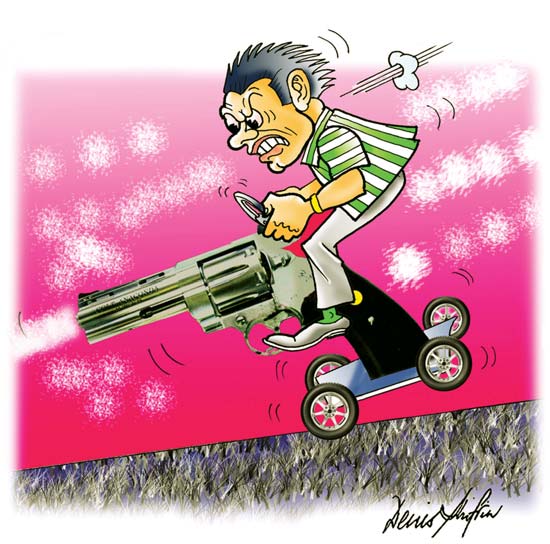
Illustration: Denis Shifrin
The horrific accident involving a tourist bus on its way to Eilat seems to have been the result of poor judgment on the part of one driver when he decided to try to overtake another, and the experts will argue about his state of mind at the critical moment when he made this disastrous mistake. There will be those who condemn him unequivocally and there will be those who will look for extenuating circumstances in an attempt to conclude that it was ‘just one of those things’.
I don’t think that anyone in Israel should be particularly surprised about this so-called ‘accident’. I don’t think we need any experts or witnesses to pinpoint the real cause. For years we have related to an annual toll of several hundred dead and several thousand injured as ‘just’ one of those things. Our reaction to an unfortunate victim of an act of terror by an enemy of the state is totally different from our reaction to an unfortunate victim of an act of negligence by a driver on our roads. In both cases, the victim is dead and the family devastated. However for some reason we react to the one with anger and demands for a solution, and to the other with momentary regret and then something close to indifference.
We have to redefine our definitions and our values. In the first place, we have to stop referring to deaths on the road as ‘accidents’. The fact that the perpetrator of a killing on the roads did not intend to commit the act does not put the victim’s death on a par with falling off a ladder or drowning at the beach. Road deaths are not accidental; in the majority of cases they are the result of negligence, and sometimes criminal negligence, on the part of someone other than the victim.
Secondly, we have to eliminate the image and use of a car as a symbol of independent activity, allowing the owner to express his or her most basic aggressive instincts towards others in a way that they would never dare if they were exposed to the object of their anger. This protective metal tank on wheels, with a device (an accelerator) enabling escape from any retaliatory action, turns mice into wannabee men.
Thirdly, we have to stop finding excuses for the perpetrators. Poorly constructed or maintained roads, inadequate signposting or safety features, inefficient police enforcement of roads traffic laws and lenient treatment of offenders by the court system are all little more than ‘red herrings’.
Fourthly, we need to decide who is really responsible for this phenomenon and then we need to deal with the matter. I am convinced that to blame and punish a driver who was the primary perpetrator of an event may be necessary and may satisfy our desire for easy answers, but it does little to attack the root cause. What is needed is for all of us to accept responsibility for a cultural blind-spot that has allowed us to become desensitized to road traffic deaths. I suspect that this leniency on our part stems from the fact that most of us are drivers and all of us have experienced ‘near-misses’ when only by means of a split-second and timely reaction have we managed to avoid disaster. The knowledge that “there but for the grace of God go I” leads us to empathize with the perpetrator at the same time as we sympathize with the victim.
This needs to change. The entire culture surrounding the driving of a private vehicle needs to be overhauled at source. Our society has to take drastic steps in order to protect itself. If we can, with ease, ban smoking in public places because it is injurious to the health of those around us, it shouldn’t be that difficult to tackle the problem of dangerous or negligent driving if the will to do so is really there. If we are serious about reducing the carnage on the roads, it needs to be made clear to all of us that our society will no longer tolerate antisocial behavior on the part of road users. This will most certainly impinge on freedoms that we currently take for granted, but no society can allow its citizens unfettered freedoms when these interfere with the public good.
Driving a car or bus or truck is not a right in the sense that we have rights as members of a society to certain fundamentals. Driving should be a privilege granted only to those members of society who can be trusted not to abuse it. The criteria for deciding who should be allowed to drive should be adapted from the criteria for allowing citizens to own hand-guns, where the onus is on the citizen to provide proof of need and proof of ability to be responsible for the maintenance, safekeeping and above all the use of a deadly weapon. The motor vehicle, if improperly handled, is indeed a deadly weapon.
I have some specific proposals which will sound extreme, but only by extreme means will we effect a fundamental cultural change. It must start with education. Every young person in high school should have to pass a bagrut (matriculation examination) on responsible citizenship, with the major emphasis on road safety. I am not talking about the lip-service that is paid to the subject at present, but the upgrading of the subject to a level on a par with mathematics or English. This course should go far beyond the technicalities of being a safe user of the roads and streets; it should go deeply into the ethics of being a member of society, of responsibility for others, of obligations before rights. If necessary, this course should be given at the expense of just about any other subject in the curriculum; nothing else comes close if the object of education is to prepare a young person for the real world. Failure to obtain this bagrut will mean ineligibility for a driving license, period.
Driving instruction should concentrate on the installation of a culture of defensive driving and on preventing the development of aggressive, negligent or inattentive driving habits. The underlying theme of the instruction should be that every so-called accident is preventable; it is almost always just a matter of every driver and every pedestrian exercising proper care and caution.
Newly licensed drivers should only be permitted to drive vehicles fitted with speed governors preventing the vehicle from exceeding 70 kph. For such new drivers there should be a total ban on the use of cellular telephones, I Pods, radios and any other devices that distract attention from the single minded purpose of getting from point A to point B safely.
The penalties for infringing road traffic laws should be draconian. We must put an end to the phenomenon of some drivers accumulating twenty or more convictions for serious traffic offences. Driving without a valid license should merit a mandatory prison sentence, with no exceptions. The minimum sentence for a driver convicted of a first offence involving the injury of a third party should be suspension of his or her driver’s license for three years and the payment of appropriate compensation to the victim. Conviction for a second such offence should result in an automatic, mandatory lifetime ban on the right to drive. Conviction for an offence involving the death of a third party should be punished by mandatory imprisonment as well as a lifetime ban on driving.
I could go on, but the general idea should already be clear. We must find the means to change an entire culture. No more machoism or aggressive feminism on our roads. We must put an immediate end to the image of a car as an instrument of power or dominance or as a symbol of independence. Every driver must respect or must be forced to respect every other road user as if they were all members of his immediate family. The right to use a car must stop as soon as that right impinges on the rights of others. Our commendable sensitivity to the value of human life, our concern for a single soldier imprisoned by a cruel enemy, our willingness to pay almost any price to recover the remains of those killed in war are all inexplicable unless we are able to change our attitude to self-inflicted carnage.
 The Bereavement & Loss Program
The Bereavement & Loss Program Thank You Eddie
Thank You Eddie Save One Life, Save A World
Save One Life, Save A World From Australia with Love
From Australia with Love Monkey Tales
Monkey Tales A fresh spirit of Zionism from Manhattan
A fresh spirit of Zionism from Manhattan Ilan Shachar
Ilan Shachar